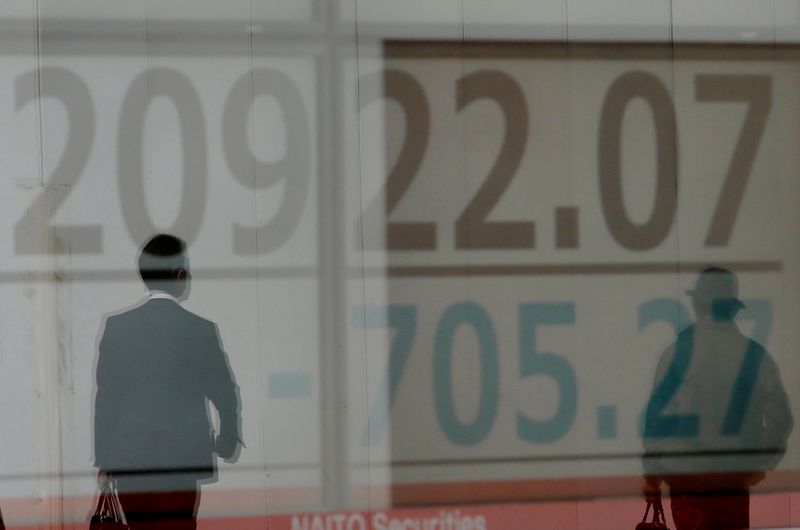This post was originally published on this site
 © Reuters. FILE PHOTO: Men are reflected on an electronic board showing the Nikkei stock index outside a brokerage in Tokyo
© Reuters. FILE PHOTO: Men are reflected on an electronic board showing the Nikkei stock index outside a brokerage in TokyoBy Stanley White
TOKYO (Reuters) – Asian shares fell on Friday following another Wall Street rout as disruptions to global business from the coronavirus beyond China worsened, stoking fears of a prolonged world economic slowdown.
MSCI’s broadest index of Asia-Pacific shares outside Japan () was down 0.5%. Australian shares () fell 1.86%, while Japan’s Nikkei stock index () slid 1.45%.
Yields on 10-year U.S. Treasuries fell to a record low as investors increased bets that the Federal Reserve will follow this week’s surprise 50 basis point rate cut with further easing to prevent corporate bond spreads from widening further.
Tumbling yields hammered the dollar, which traded near a six-month low versus the yen and close to a two-year trough against the Swiss franc.
Oil prices rose on hopes that output cuts would protect the market from an expected decline in global energy demand.
The spread of a new coronavirus has accelerated so much in Europe, Britain and North America that investors who once played down the virus are now re-assessing the risks, which means more volatility in financial markets.
“Optimism overseas is fading and now people are really starting to question just how bad things will get,” said Takuya Kanda, general manager of research at Gaitame.com Research Institute in Tokyo.
“For some investors, Treasuries are the only place to park their money, but for others buying the dollar or stocks is out of the question.”
U.S. stock futures () rose 0.43% in Asia on Friday, but that did little to brighten the mood.
The S&P 500 () tumbled 3.39% on Thursday. The benchmark S&P 500 ended down more than 10% from its Feb. 19 closing high, after last week logging its biggest weekly percentage decline since October 2008.
Officials and companies in Britain, France, Italy, and the United States are struggling to deal with a steady rise in coronavirus infections that have in some cases triggered corporate defaults, office evacuations, and panic buying of daily necessities.
The flu-like virus emerged late last year in the central Chinese city of Wuhan and has since spread to more than 80 countries and claimed more than 3,000 lives. New infections have slowed in China, but there are concerns other countries are not prepared.
Travel restrictions and factory closures aimed at curbing the spread of the virus are expected to put downward pressure on global economic growth.
Many investors await the release of U.S. non-farm payrolls later on Friday. Recent U.S. economic data has been strong, but concerns about the epidemic are likely to overshadow any signs of a strong labor market.
The Federal Reserve and Bank of Canada both responded to the economic threats by cutting interest rates by 50 basis points this week.
The yield on benchmark 10-year Treasury notes () fell to a record low of 0.8980% in Asia Friday.
Money markets were pricing in another 25 basis-point-cut from the current 1% to 1.25% range at the next Fed meeting on March 18-19 and a 50-basis-point cut by April.
Against the Japanese yen , the dollar fell to a six-month low and was last at 106.30 yen. The greenback also sank to a two-year trough of 0.9447 Swiss franc .
Sterling traded near a one-week high versus the dollar.
The euro () eased slightly to $1.1215. Markets in the euro zone are pricing in a 93% chance that the European Central Bank will cut its deposit rate, now minus 0.50%, by 10 basis points next week.
U.S. crude () ticked up 0.87% to $46.3 a barrel. OPEC on Thursday agreed to a bigger-than-expected oil output cut to support prices that have been hit by the coronavirus outbreak.

